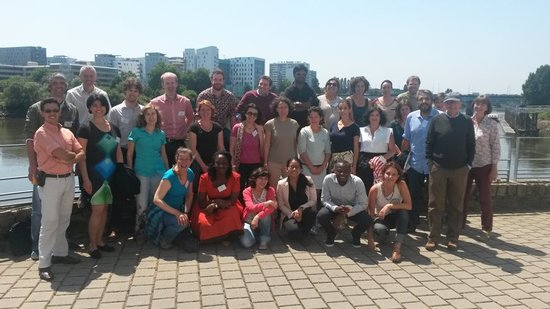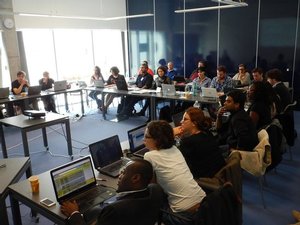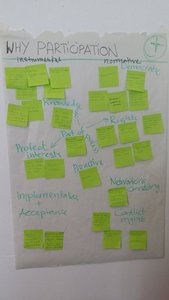Ecole d'été "Planification et gestion des espaces maritimes"

Du 1er au 5 juin 2015, 24 étudiants (en doctorat, post-doctorat ou master 2) ont été sélectionnés et se sont réunis autour d'experts internationaux sur le thème de la planification et la gestion des espaces maritimes.
Cette école d'été s'est appuyée sur le Marine Spatial Planning research Network (MSPRN).
LES PARTICIPANTS
Pas moins de 10 nationalités différentes pour ces 24 étudiants, dont 2 d'entre eux poursuivent actuellement leur études à Nantes. Ils proviennent d'horizons aussi variés que la Colombie, la Crête, l'Espagne, l'Irlande, l'Afrique du Sud, l'Allemagne, l'Italie, le Portugal, l'Inde et la France.
Les intervenants quant à eux viennent du Portugal, de France, d'Espagne, de Suède, d'Allemagne, du Royaume Uni et d'Irlande. Merci à Andréa MORF, Andreas KANNEN, Gillian GLEGG, Holger JANSSEN, Stephen JAY, Thomas KLENKE, Cathal O'MAHONY, Helena CALADO, Maria DE FATIMA LOPES ALVES, Juan Luis SUAREZ DE VIVERO, et Brice TROUILLET.
LE PROGRAMME (à télécharger en fin d'article)
Le premier après-midi a été consacré à une excursion sur le terrain (St Nazaire, Le Croisic). Les matinées suivantes ont commencé par des discussions croisées, suivies d'interventions des experts invités, et des exercices pratiques ont clôturé chaque journée.
Discussions croisées à la MSH Ange-Guépin
Excursion sur le terrain
Des exercices pratiques très productifs !
LES ETUDIANTS TEMOIGNENT :
Note moyenne du contenu scientifique de l'école d'été : 8,2 / 10
Note moyenne de l'organisation de l'école d'été : 8,4 / 10
Note moyenne de correspondance avec leurs objectifs : 8,4 / 10
Tous confirment que l'école d'été a été utile à l'élaboration de leur réseau professionnel.
Tous confirment qu'ils auront l'utilité dans leurs futures études du contenu scientifique et des techniques apprises, en particulier :
- Design of MSP and engagement of stakeholders
- Regulation of coastal uses
- The concepts; knowledge on legislation; spatial planning and zoning and stakeholder involvement.
- Aspects on the multiple spatio-temporal scales in MSP & transboundary issues
- All of it. MSP hasn't really taken off in [my country] so all the knowledge I gained at the summer school will be useful for me.
- The stakeholder engagement topic was very interesting and usefull for future experiences I may have in preparing this types of meetings
- Everything. In particular I will employ some of the idea visualisation and brainstorming processes again.
- Stakeholder involvement and engagement Linking maritime and coastal planning
- I liked the international approach to the treated topics and the experiences of the colleagues in the different fields.
- In the project I am working DECCMA
- Presentation techniques and participation.
- Monitoring MSP
- Maritime policy presented by Profesor [X], as well as different examples and perspectives of MSP initiatives and solutions worldwide, presented by colleges from all around the world.
Ce qu'ils ont préféré :
- It was interactive and interdiscciplinar, so many different views were introduced
- Many speakers from different fields
- The variety of topics covered; the presentations and discussions within teachers and students; international networking; crossed-discussions
- Organization, great quality of speakers, exchanges & ambiance
- Networking opportunities / Learning about MSP from the perspective of different countries / City of Nantes / The food was amazing! / Pauline Borgniet was so helpful! Especially for me who was coming from so far away.
- I enjoyed the group and its diversity, wwith people from different backgrounds and studying different topics, this provided a broad prospect of MSP possibilities.
- Field trips, individual presentations of the participants
- Networking, knowledge sharing, cooperation, collaboration, capacity building, brainstorming, idea visualisation, problem solving
- Meet people working on the same subject
- Opportunity to meet other scientist working in the area / Opportunity to discuss the topics I work and see how the colleagues deal with the same issues
- Teaching
- The contributions of different types of national legislation and views in the framework of the European Union.
- Organization / Multi-disciplinaries / Interaction with partecipants / Level of "lessons" and presentations
- Well organized / Practical involent of students
Télécharger Programme.pdf


